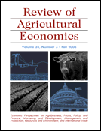A Note from the Editors
This is the second issue of the Review of Agricultural Economics in which proceedings of the Allied Social Sciences Association conference are published. Proceedings issues are never easy. There are page limits assigned to each session, tight deadlines, and an arduous editing process. All these require the full attention of the session chairs, organizers and authors who again came through in a timely fashion. The editorial team appreciates the cooperation of all those individuals.
The current issue is devoted entirely to proceeding of the ASSA meeting held in Boston last January. Articles from the conference's six principal paper sessions cover such important topics as diet and nutrition policy, trade liberalization, and food security. In addition, a session was devoted to the work of T.W. Schultz. Another session covered applications of quasi-experimental methods in agricultural economics.
The issue of obesity is featured almost daily in newspapers and television. The three papers in the first session discuss policy issues related to obesity in developing and developed countries. Luo, Mu, and Zhang, for example, present the impact of exposure to famine in early life on overweight in adulthood several decades later. Asfaw analyses the effect of the Egyptian food subsidy program on obesity prevalence among mothers. Alston, Sumner, and Vosti ask if agricultural policies are making us fat and consider the likely links between agricultural policies and human nutrition and obesity.
The legacy of T.W. Schultz was the topic of the second session which contains five papers, including the inaugural T.W. Schultz Lecture delivered by Becker. Gardner examines Schultz's contributions to agricultural economics under two headings: the economics of farming and agricultural policy while Otsuka considers the relevance of Schultz's thesis on transforming traditional agriculture into a modern sector for the development of agriculture in sub-Saharan Africa.
Two sessions and a total of six papers were devoted to trade liberalization and the Doha Round. Several papers focus on specific countries, including Brazil and the Philippines, while others deal with the larger issues of regional trade agreements, the impact of agricultural subsidies on global welfare and the effects of globalization on income levels and developing countries' rates of economic growth.
Empirical application of quasi-experimental methods in our profession is the topic of two papers in the fourth session. Roberts, Key, and O'Donoghue test for the presence of moral hazard by examining the effect of insurance on output (yield) rather than inputs.
Schlenker and Roberts examine the reduced-form relationship between weather and yields using a unique data set of corn yields and daily weather records covering the eastern United States for 1950–2004.
Finally, the HIV epidemic in Africa has had not only human toll but also economic effects. Two papers in the final session consider the impacts on the labor market and wages in Malawi and community resilience in Zambia.
The Review of Agricultural Economics has come a long way: submissions are up, quality of submissions has increased, and our journal is cited more often than ever before. The bottom line is that the Review is continuing to progress in serving the members of our association.




